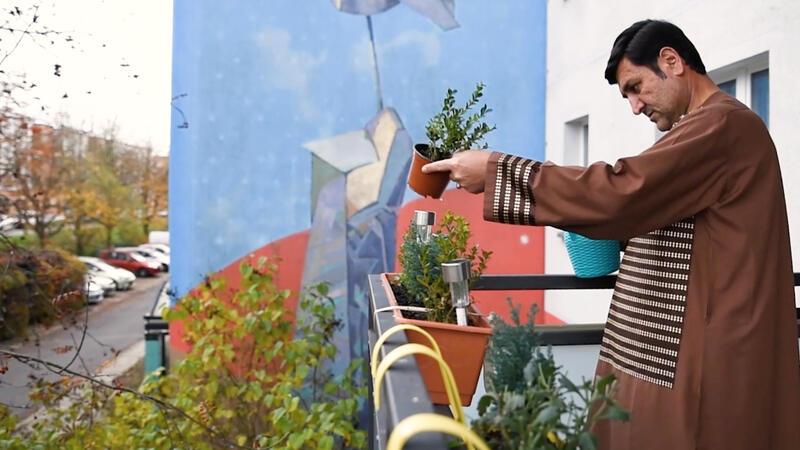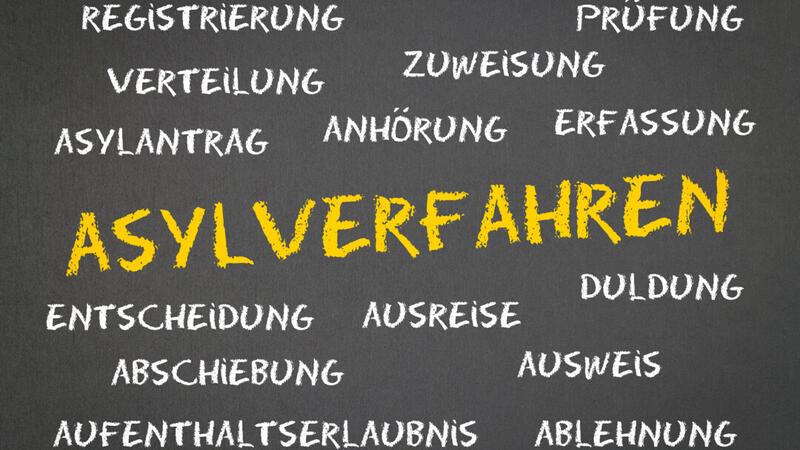Refugee Accommodation Centres
What are my rights as a resident?
In initial reception facilities, often large groups of people live in limited spaces. So there are rules and standards to help the residents live together, and the staff are responsible for ensuring these regulations and standards are implemented and respected. In principle, these rules apply to all accommodation centres, including shared accommodation centres and, except a few exceptional cases, also emergency shelters.
What do I need to know?
- Every accommodation centre has its "house regulations" ("Hausordnung") which apply to all of its residents. These rules specify, for example, when one can have visitors or at what time the "Quiet Hours" start in the evenings. The centre's director is responsible for overseeing the implementation of these rules.
- The security staff are responsible for the safety of the residents and keeping the order. That's why they are allowed to control visitors' ID cards. At least one female security employee must always be present at accommodation centres.
- The social workers take care of the social problems in the accommodation centre. You can approach these employees whenever you have questions or face challenges. They can assist you, e.g. in registering at a day-care centre, searching for a flat or seeking a doctor or counselling centre.
Attention: The employees in the accommodation centres are not responsible for your legal issues, e.g. asylum procedure. They cannot influence your asylum procedure's results or the amount of social assistance you receive - neither are they permitted to pass any information about you to the BAMF or other authorities.
You are entitled to live in a safe space. Women, adolescents and children, in particular, need to be protected from threats or violence. The accommodation centres must ensure that all their residents feel safe, have their privacy, and know where to get help. In July 2016, the Ministry of Family Affairs along with UNICEF and other organisations, such as Plan International Germany e.V. has developed a program to implement the minimum standards for the protection of children, adolescents and women in refugee accommodation centres and all the centres were required to comply. These standards require children, adolescents and women to be protected from violence and to be guaranteed access to medical and psychosocial care. Besides, in every centre, there should be specific room, in which the children and youth can play and learn together.
There are standards for placement in an accommodation centre. In general, you have no say in which room you will be accommodated, and the single individuals cannot choose who to share the room with. If you have any problems with your roommates, contact the social workers or the centre's director.
- As a couple or family, you have the right to live together in a room.
- Women can only be accommodated in a room with other women.
- It is your right to have a room with a door lock and key. If you share the room with other people, you have the right to a cabinet with a lockable door.
- The centre's management personnel are not allowed to enter your room without your permission.
- No room control is allowed in your absence or without prior notice.
- You have the right to receive visitors during the day-time.
- You should receive fresh towels every week and clean bed linen every second week.
- You must inform the centre's management office if you are going to be absent overnight. If you stay out of the centre for more than 3 consequent nights, the centre may assign your room/bed to another person. Your personal belongings, of course, must be kept safe.
- You have the right to clean, accessible and gender-specific toilets and showers.
- You have the right to healthy, diverse and adequate food. It must not contain pork meat.
- The centre's management must inform you about your incoming letters on a daily basis.
There are always some accommodation centres that do not adhere to these rules and standards. Much has already been done to improve the situation in all the centres, but there are still shortcomings. If there are problems in your centre and your rights are disregarded, contact a counselling centre or the Refugee Council ("Flüchtlingsrat) in your state. Here you will find a list of counselling centres in your federal state of residence.
In case you are being insulted, discriminated against, threatened or confronted with sexual or physical violence in your accommodation centre, please directly refer to the centre's administration or the social worker. If they do not help or are in fact part of the problem, then contact a counselling centre. On the website of the Anti-discrimination Office, you will find a list of counselling centres in your area. If you are a woman, you can also visit http://www.frauen-gegen-gewalt.de/and frauenhauskoordinierung.de to seek a counselling session in your language nearby. You can also call the Helpline at 08000-116016. The staff there are available day and night, and they speak many languages.
Whether you are allowed to move into a flat depends on your residence status:
- I am entitled to asylum, a recognised refugee or have subsidiary protection: You have the right to move into your own flat.
- I am an asylum seeker: Whether you are allowed to move into a flat as an asylum seeker depends on your country of origin, the length of your stay in Germany and the regulations in your federal state. In general, asylum seekers must live in an initial reception centre for at least six weeks and a maximum of 24 months. While you are obliged to live in an initial reception facility, you are not allowed to move into a flat. Please note: If you come from a so-called "safe country of origin", you must live in an initial reception centre for the entire duration of your asylum procedure and, if your asylum application is rejected, until you leave the country or are deported. You can find out more about it in our chapter "Safe countries of origin".
- I have a „Duldung“: People with a „Duldung“ generally have no right to move into a flat. Officially speaking, communal accommodation is designated for individuals with a tolerated stay or “Duldung”. In some cases, such a residence obligation is even specified as a condition on your „Duldung” paper. In some communities, however, there is not enough space in such shared accommodation facilities to accommodate everyone. When that is the case, you will either be assigned a flat or allowed to find on for yourself. If you have to live in a shared accommodation facility, you can try to apply for the revocation of this requirement at the Immigration Office. In addition, you must apply to the Social Welfare Office to have them cover the costs of your flat. The authorities can comply with your request, but they may also refuse to do so. In general, your chances are rather low if you cannot provide convincing grounds for your request, for instance, mental or physical illnesses. Seek advice from a counselling centre or lawyers in advance. You can find lawyers and counselling centres in your area on our Local Information page. Enter the name of your city and search for asylum, residency or legal advice service nearby.
Please note: If you continue to live in a communal accommodation facility while working and earning an income, you must expect to be asked to pay a high rent from your wages.
Whether you are also allowed to move to other cities or municipalities depends on your residence status.
In principle, Persons entitled to asylum, recognised refugees and those entitled to subsidiary protection who receive social benefits from the Social Welfare Office or Jobcenter must remain in the federal state in which they went through their asylum procedure for three years. The federal states can also enforce additional regulations to, for example, oblige the person to remain in the municipality where they lived during their asylum procedure. However, this "residence assignment" („Wohnsitzzuweisung“) is controversial. If you have good reasons why you would like to move to another municipality, you can apply for the revocation of the residence assignment (in accordance with Section 12a (5) sentence 2c Residence Act) at the Immigration Office currently responsible for you and the Immigration Office of the city where you wish to live. Seek advice from a counselling centre or lawyers in your area.
In principle, asylum seekers and people with „Duldung” must remain in the municipality to which they were assigned at the beginning. You are only allowed to move if you find a job and can provide for yourself and do not receive any financial support from the Social Welfare Office. For people who receive financial support from the Social Welfare Office, there are only a few opportunities to obtain permission to move to another municipality. As a rule, the Immigration Office will only approve your application if, for example, you are very ill and there are no doctors in your community who specialise in your illness, or if you have to look after a sick family member in a city. You must prove your reasons with valid evidence. Seek advice from a counselling centre or lawyers in advance.
Note: You can find lawyers and counselling centres in your area on our Local Information page. Enter the name of the city where you live in and search for asylum, residency or legal advice service.
Yes. According to the Measles Protection Act, everyone who lives in shared accommodation facilities must prove that they are vaccinated against measles. If you have not yet been vaccinated against measles, you must do so within 4 weeks of your arrival. The staff in your accommodation centre will help you further. You can learn more in our chapter "Vaccination".
Important
Check your letters every day. Sometimes you receive letters informing you about important appointments with the migration authorities in the coming days. It is quite crucial that you appear on time on all such dates.
If you are sent to another accommodation centre or have voluntarily moved there, it is necessary to notify the Foreigner's Registration Office ("Ausländerbehörde") and the BAMF and provide them with your new address. Otherwise, you will no longer receive their letters and may miss important dates or deadlines.







